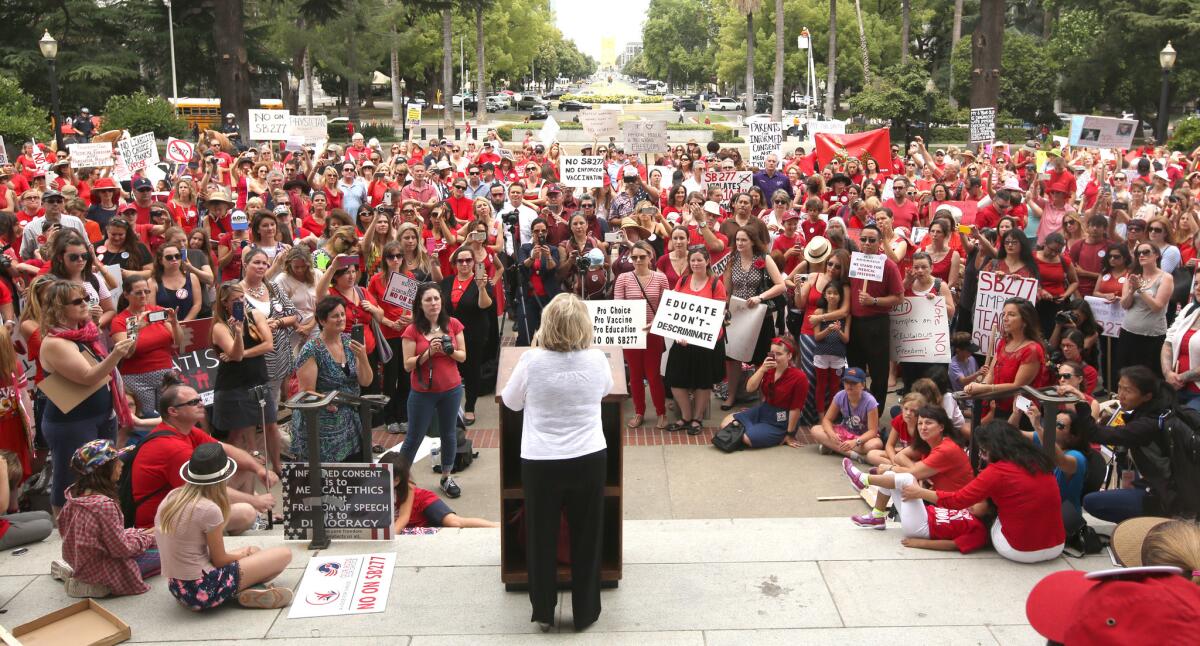Assembly panel supports California vaccination mandate

Barbara Loe Fisher, center, founder of the National Vaccine Information Center, speaks against SB 277, a measure requiring California schoolchildren to get vaccinated, at a Capitol rally.
- Share via
Reporting from Sacramento — A proposal to require many more children to be vaccinated in California was approved Tuesday by a state Assembly committee despite opposition from hundreds of parents, many of whom argued they should be able to choose what medical treatment to seek for their children.
The 12-6 party line vote by the Assembly Health Committee sends to the full Assembly a bill that would eliminate the ability of parents to exempt their children from being vaccinated based on personal beliefs.
It would leave only medical issues, such as a compromised immune system, as a reason a child would not be immunized before entering kindergarten. The Senate previously approved the measure.
“This is fundamentally a bill about public health. Every child deserves the right to go to school in a safe and healthy environment,” said Assemblyman Rob Bonta (D-Alameda), the chairman of the panel at the end of the five-hour public hearing.
Sen. Richard Pan (D-Sacramento), a pediatrician and co-author of the bill, said a low rate of vaccinations in some communities helped contribute to an outbreak of measles recently at Disneyland that ended up infecting 134 state residents.
“SB 277 is about freedom; freedom from deadly contagions that are now preventable because of vaccines,” Pan told the committee.
Opponents disagreed. “My biggest issue is the loss of freedom,” said Assemblywoman Marie Waldron (R-Escondido). “Informed consent is a human right.”
Pan agreed to some amendments to the bill, including one providing physicians with the clear authority to consider a family’s medical history in deciding whether to sign a medical waiver for a child.
One physician in favor of the bill said that it is necessary to prevent deaths and injuries to children.
A statement from Catherine Sonquist Forest, medical director of Stanford Health Care, was read at the hearing and referred to a 4-year-old boy in California who is dying from a form of encephalitis that was caused by exposure to the measles when he was 5-months-old, too young to be immunized.
“His family has authorized me to share his story, in the hope that it may persuade you to prevent the senseless suffering and death of other children,” Forest said in the statement.
Opponents say that they have concerns about the safety of vaccines and that the state should not be deciding what medical treatment is given to their children.
They also said physicians rarely give medical exemptions. As a result, the bill “fails to value the health and educational needs of vulnerable children,” said Barbara Loe Fisher, president of the National Vaccine Information Center, a nonprofit group critical of the drug industry.
Before the committee meeting, at a rally on the Capitol steps attended by hundreds of red-shirt-wearing opponents of the bill, Assemblyman Jim Patterson (R-Fresno) stirred things up by referring to “internment camps” when discussing the proposal.
Patterson was talking about how the bill would require unvaccinated children to be home-schooled or attend an independent study program. “I wouldn’t call it a concentration camp,” he said, “but they’re suggesting [students] go some place other than public school.” He added that he “thought we apologized for internment camps,” a reference to facilities set up during World War II to separate Japanese Americans from the rest of the population.
Afterward, Patterson told The Times he should not have used those phrases.
“It was a bad choice of words,” he said, “but I think that the bill provides an excessive penalty, which is to isolate and to segregate these children as if they are some kind of threat.”
More to Read
Sign up for Essential California
The most important California stories and recommendations in your inbox every morning.
You may occasionally receive promotional content from the Los Angeles Times.














